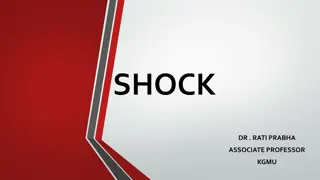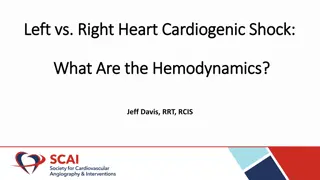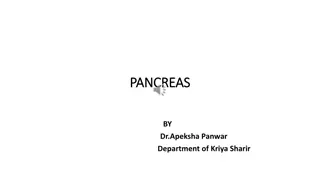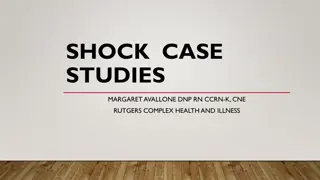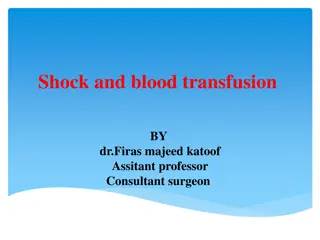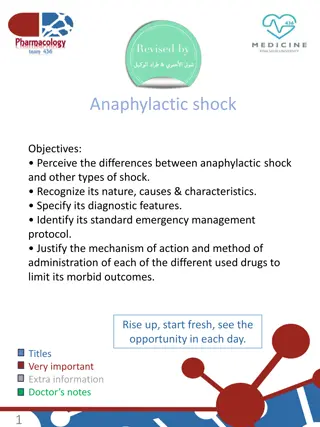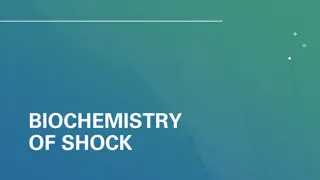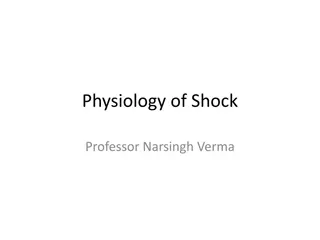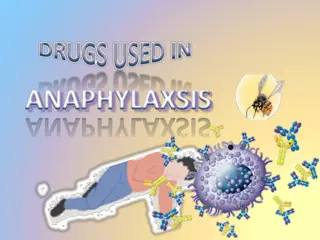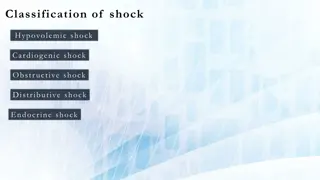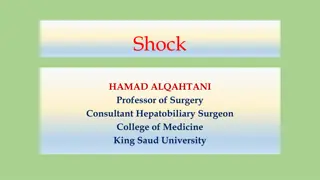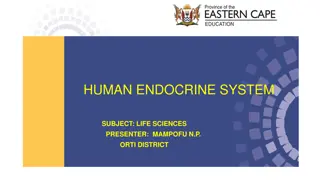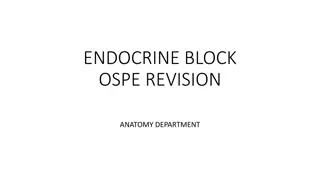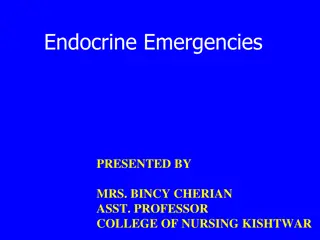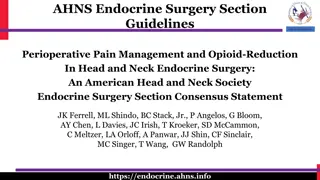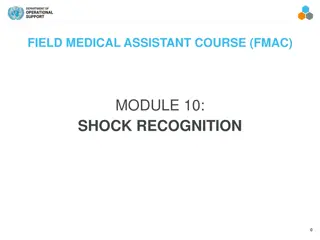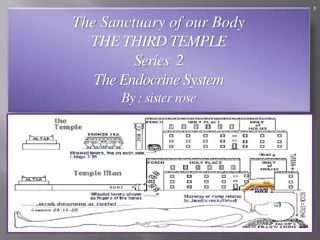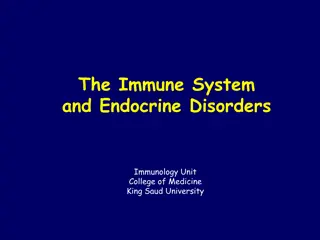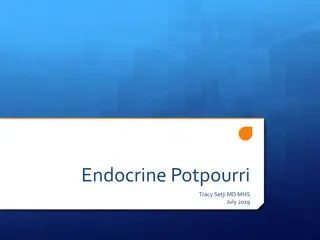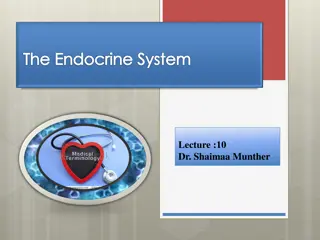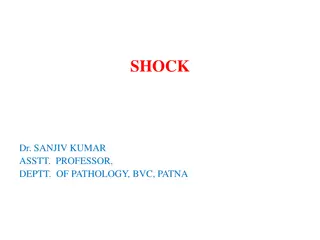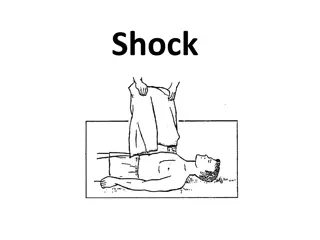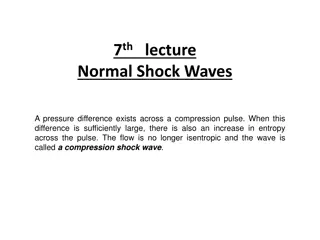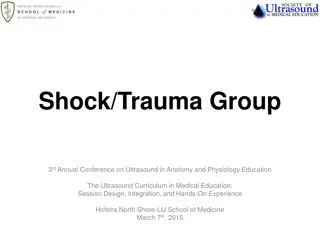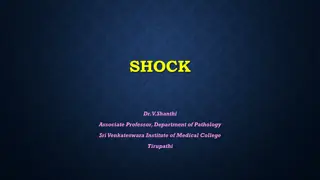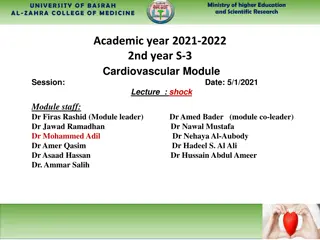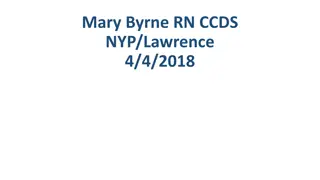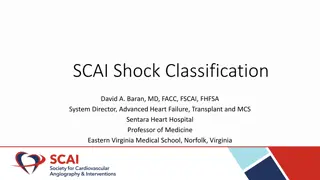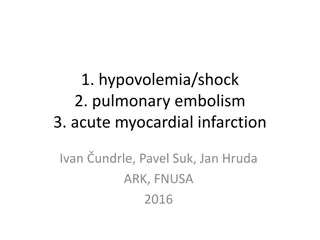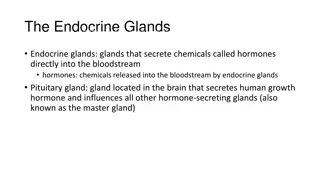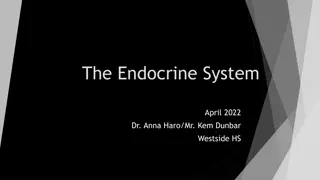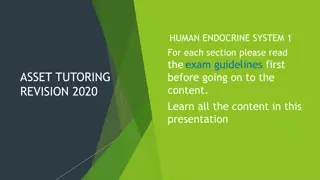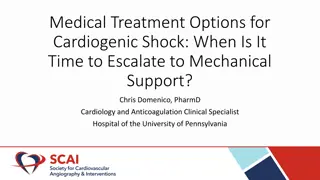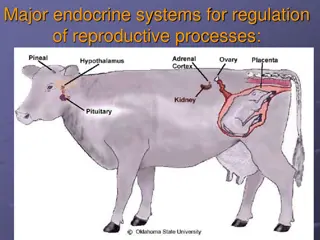Understanding Shock: Causes, Symptoms, and Stages
Shock is a critical condition caused by an imbalance between cellular oxygen supply and demand, leading to organ dysfunction. Compensatory responses include increased heart rate, vasoconstriction, and hormonal adjustments. Recognizable features of shock include tachycardia, hypotension, cool clammy
3 views • 27 slides
Understanding Hemodynamics in Left vs. Right Heart and Cardiogenic Shock
Explore the hemodynamic differences between the left and right heart, the etiologies of cardiogenic shock, and the importance of right heart catheterization in managing this critical condition. Learn about key parameters such as PCWP, RAP, CO, and more that play a crucial role in assessing cardiac f
1 views • 14 slides
Comprehensive Overview of Pancreas Function and Structure
Pancreas is a vital organ in the abdomen with dual exocrine and endocrine functions. As an exocrine organ, it secretes digestive enzymes and bicarbonates into the duodenum for food breakdown. In its endocrine role, the pancreas regulates blood sugar levels by secreting insulin, glucagon, somatostati
1 views • 16 slides
Shock Case Studies: Patient Management Scenarios and Interventions
Explore patient scenarios of hypovolemic shock post-surgery, learn key assessments, prioritize actions, recognize shock manifestations, and apply interventions. Dive into the complexities of patient care in critical situations.
0 views • 60 slides
Understanding Shock and Blood Transfusion in Surgery
Shock is a state of low tissue perfusion leading to metabolic changes like anaerobic metabolism and acidosis. As cellular hypoxia progresses, immune and coagulation responses are activated, impacting cardiovascular, respiratory, renal, and endocrine systems. Shock can be classified into hypovolaemic
0 views • 38 slides
Understanding Anaphylactic Shock: Diagnosis, Management, and Drug Therapy
Anaphylactic shock is a life-threatening allergic reaction that can lead to shock and airway swelling. Learn about the differences from other types of shock, diagnostic features, emergency management protocol, and drug therapy to limit morbid outcomes. Discover the nature, causes, and characteristic
1 views • 12 slides
Understanding the Biochemistry of Shock
Shock is a critical condition where circulation fails to meet cells' nutritional needs, leading to a range of potentially life-threatening events. Primary and secondary types of shock are discussed, emphasizing the significant impact on oxygen supply and demand at the cellular level. The effects of
0 views • 17 slides
Understanding the Physiology of Shock by Professor Narsingh Verma
Shock is a critical condition resulting from poor tissue perfusion and impaired cellular metabolism. Various definitions describe it as inadequate delivery of oxygen and nutrients, leading to reversible or irreversible cellular injury. Different types of shock, such as hypovolemic shock, have common
0 views • 24 slides
Understanding Anaphylaxis and Anaphylactic Shock
Anaphylaxis is a severe allergic reaction affecting the entire body, while anaphylactic shock is a life-threatening manifestation of this reaction involving shock and airway swelling. This comprehensive material delves into the nature, causes, symptoms, diagnostic features, emergency management prot
0 views • 18 slides
Overview of Shock Classifications and Causes
Shock is classified into different types such as Hypovolemic, Cardiogenic, Obstructive, Distributive, and Endocrine shock. Hypovolemic shock results from fluid loss, while Cardiogenic shock is due to heart failure. Obstructive shock occurs from mechanical obstructions, whereas Distributive shock is
1 views • 11 slides
Understanding Shock: Etiology, Pathophysiology, Diagnosis, and Management Priorities
Shock, a condition where blood circulation fails to deliver sufficient oxygen, is a common cause of death in surgical patients. Recognizing shock early is crucial to prevent irreversible tissue damage and organ failure. It is vital to understand the various aspects such as etiology, pathophysiology,
2 views • 55 slides
Overview of Human Endocrine System in Life Sciences Presentation
This content provides a detailed examination guideline for understanding the human endocrine system in the field of life sciences. It covers essential topics such as the difference between endocrine and exocrine glands, hormone functions, gland locations with functions, and key terminology related t
1 views • 17 slides
Endocrine Block OSPE Revision - Anatomy Department Presentation Slides
Explore this set of presentation slides prepared by the Anatomy Department for Endocrine Block OSPE Revision. The slides cover essential topics related to endocrine anatomical structures and functions, providing a comprehensive resource for revision and review.
0 views • 11 slides
Understanding Glands: Endocrine and Exocrine Systems
Glands play a crucial role in the body by producing and releasing substances for specific functions. Endocrine glands release hormones directly into the bloodstream, while exocrine glands secrete substances through ducts onto bodily surfaces. Different types of exocrine glands, such as sweat glands,
3 views • 22 slides
Understanding Endocrine Emergencies and Diabetes Mellitus
The endocrine system plays a crucial role in regulating various bodily functions through hormone release. This presentation by Mrs. Bincy Cherian delves into endocrine emergencies, specifically focusing on Diabetes Mellitus. It explains the differences between Type I and Type II diabetes, their clin
3 views • 28 slides
AHNS Endocrine Surgery Section Guidelines: Perioperative Pain Management and Opioid Reduction
The American Head and Neck Society Endocrine Surgery Section provides consensus statements on perioperative pain management and opioid reduction in head and neck endocrine surgery. Addressing the opioid addiction crisis, the expert panel offers guidelines on pain management strategies, opioid prescr
0 views • 18 slides
Tactical Field Care - Shock Recognition and Management
Tactical Field Care emphasizes the importance of shock recognition and prompt intervention to prevent casualties on the battlefield. Understanding the signs, symptoms, and management steps of shock, particularly in trauma cases with life-threatening bleeding, is crucial for medical personnel. This m
0 views • 18 slides
Understanding Culture Shock: Phases, Symptoms, and Coping Strategies
Culture shock is the anxiety and disorientation experienced when adapting to a new and unfamiliar culture. This phenomenon involves various stages, from the honeymoon phase to readjustment and reverse culture shock. Symptoms of culture shock can be physiologically, psychologically, and socially base
1 views • 11 slides
Exploring the Endocrine System as the Third Temple of our Body
Delve into the fascinating connections between the endocrine system and biblical references, likening its functions to the operations of the Tribe of Asher. Discover how this system, composed of glands producing hormones, impacts growth, metabolism, and sexual development. Explore the intricate netw
0 views • 24 slides
Understanding the Interplay of the Immune System and Endocrine Disorders
Explore the intricate mechanisms of immunological damage to endocrine glands, focusing on disorders like Graves disease, Hashimoto's thyroiditis, type I diabetes, and Addison's disease. Delve into the association of autoantibodies with pathogenic and diagnostic significance, uncovering the complexit
0 views • 33 slides
Endocrine Potpourri: Adrenal Insufficiency and Incidentalomas - Case-Based Review
This endocrine potpourri covers various cases involving adrenal insufficiency, adrenal crisis, adrenal incidentalomas, and patient education. It includes a detailed case presentation, treatment guidelines for adrenal crisis, patient education on adrenal insufficiency, and evaluation of adrenal nodul
0 views • 62 slides
Understanding the Endocrine System: Key Concepts and Functions
The endocrine system, consisting of glands that release hormones into the bloodstream, plays a crucial role in regulating various body processes like metabolism, growth, reproduction, and stress response. Key glands include the pituitary, thyroid, pancreas, adrenal, ovaries, and testes, each produci
0 views • 34 slides
Understanding Shock: Types, Mechanisms, and Causes by Dr. Sanjiv Kumar
Shock, a critical medical emergency, results from the failure of the circulatory system to adequately perfuse vital organs. This comprehensive overview delves into the different types of shock such as cardiogenic, hypovolemic, septic/endotoxic, neurogenic, and anaphylactic shock. Each type is explor
0 views • 12 slides
Understanding Shock: Types, Classification, and Clinical Course
Shock is a critical state where the circulatory system fails to adequately perfuse cells, leading to oxygen and nutrient delivery reduction. It can be classified into hypovolemic, cardiogenic, and distributive types, with septic shock caused by microbial infections. Shock progresses through stages f
0 views • 8 slides
Understanding Shock: Definitions, Types, and Management Principles
Shock is a condition characterized by inadequate tissue perfusion, leading to a range of systemic effects. This article outlines the definitions, signs and symptoms, general principles of management, and specific types of shock, including hypovolemic, cardiogenic, neurogenic, anaphylactic, and septi
0 views • 20 slides
Understanding Normal Shock Waves in Gas Dynamics
In gas dynamics, normal shock waves occur when there is a significant pressure difference across a compression pulse, leading to increased entropy. This results in non-isentropic flow known as compression shock waves. The formation of compression and expansion waves can be likened to piston movement
0 views • 16 slides
Ultrasound Curriculum in Medical Education: Shock/Trauma Group Conference 2015
Development of a longitudinal ultrasound module focusing on the pathophysiology of shock for educational purposes, aiming to enhance knowledge and skills in the evaluation and management of shock patients. The curriculum includes learning objectives covering shock classifications, differential diagn
0 views • 10 slides
Dynamic Calibration of Pressure Transducers in a Shock Tube
This study focuses on the dynamic calibration of pressure transducers in a shock tube to understand boundary layer stability and transition. By creating a shock to impact a Kulite pressure transducer mounted at the end of the tube, researchers aim to determine key parameters such as resonance, dampi
0 views • 11 slides
Understanding Shock: Types, Mechanisms, and Pathophysiology
Shock, a state of systemic hypotension resulting in impaired tissue perfusion and cellular hypoxia, has various types such as cardiogenic, hypovolemic, septic, neurogenic, and anaphylactic shock. Each type has different mechanisms and causes, leading to decreased cardiac output and multiorgan failur
0 views • 45 slides
Understanding Shock in Medical Science: Definitions, Classification, and Management
Shock is a critical condition caused by poor tissue perfusion leading to impaired cellular metabolism. This article discusses the definition of shock, its classification including septic, anaphylactic, cardiogenic, hypovolemic, and neurogenic shock, along with the clinical manifestations and hemodyn
0 views • 19 slides
Understanding Postoperative Shock and Respiratory Failure
Postoperative shock refers to different types of shock that may occur after surgery, such as hypovolemic, cardiogenic, or septic shock. It is crucial to recognize the signs and symptoms of shock early to prevent irreversible consequences. On the other hand, respiratory failure can be acute or chroni
0 views • 8 slides
Understanding the SCAI Shock Classification System
The SCAI Shock Classification, led by Dr. David A. Baran, introduces a new definition for cardiogenic shock, emphasizing simplicity, adaptability, and improved communication among healthcare providers. It aims to enhance patient assessment, reclassification, and research outcomes, emphasizing a mult
0 views • 27 slides
Understanding Shock: Causes, Phases, and Pathophysiology
This comprehensive guide delves into the various aspects of shock, including hypovolemia, pulmonary embolism, and acute myocardial infarction. It covers the general concept of shock, circulatory failure, phases of shock, pathophysiology, manifestations, diagnostic approaches, and complications such
0 views • 52 slides
Understanding How Hormones Interact: The Endocrine System
The endocrine system comprises glands that release hormones into the bloodstream, influencing various bodily functions. Key glands include the pituitary, pineal, thyroid, pancreas, gonads, and adrenal glands, each playing a crucial role in regulating metabolism, growth, stress response, and reproduc
0 views • 5 slides
Understanding the Endocrine System: Hormones, Glands, and Regulation
The endocrine system, comprising glands such as the pituitary, thyroid, pancreas, and more, produces hormones that regulate various bodily functions. These hormones target specific cells with receptors, influencing metabolism, growth, energy usage, and more. By understanding how hormones interact wi
0 views • 12 slides
Understanding the Endocrine System: Functions and Glands Explained
Explore the intricacies of the endocrine system with a focus on its functions such as metabolism, growth, emotions, and more. Learn about key endocrine glands like the hypothalamus and pituitary, their roles in hormone regulation, and their impact on various bodily processes. Discover the significan
0 views • 17 slides
Overview of the Human Endocrine System
This presentation covers the terminology, differences between exocrine and endocrine glands, the location and functions of various glands in the endocrine system, and general information on how hormones coordinate the body's organs to maintain homeostasis.
0 views • 17 slides
Treatment Options for Cardiogenic Shock: Pharmaceutical and Mechanical Support
This article discusses pharmaceutical treatment options for cardiogenic shock, including milrinone, dobutamine, and dopamine. It also explores criteria for escalating treatment to mechanical support in cases of severe shock. The comparison between milrinone and dobutamine in supporting patients awai
0 views • 19 slides
Endocrine Systems in Reproductive Regulation
The endocrine system plays a crucial role in regulating reproductive processes by secreting hormones that influence cellular activity. This system involves ductless glands like the hypothalamus, pituitary gland, and other endocrine glands working together in a feedback mechanism. Hormones of various
0 views • 19 slides
Understanding Traffic Flow Theory and Shock Waves in Transportation Engineering
Explore fundamental principles of traffic flow, applications of traffic flow theory, shock waves in traffic streams, and types of shock waves in transportation engineering. Learn about determining lane lengths, estimating delays, and analyzing shock wave behaviors in various traffic scenarios. Delve
0 views • 18 slides
